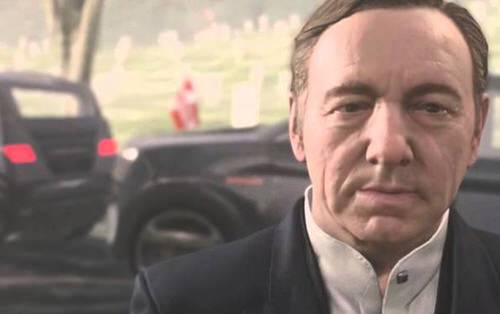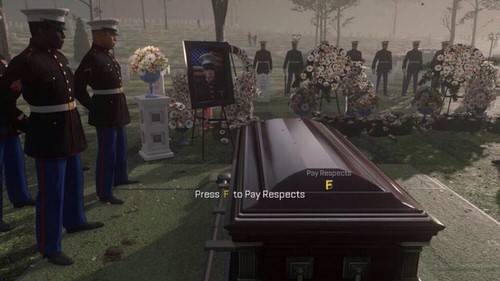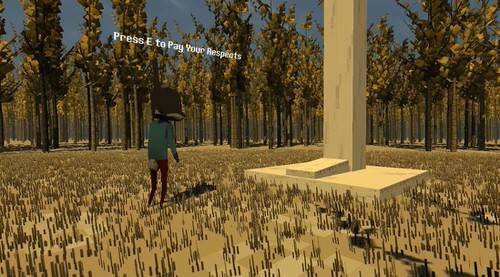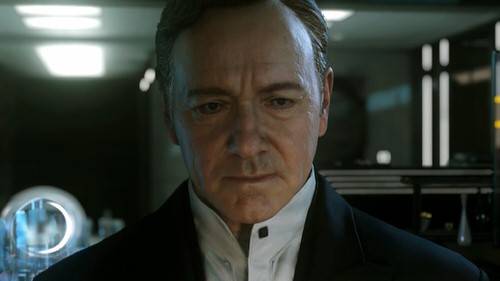
Editor’s Note: This was originally posted by our partners at Kill Screen.
Leo Burke’s Press E To wasn’t initially intended as a game critique, but it has since become one with the release of Call of Duty: Advanced Warfare. “I had a death in the family a few months ago,” Burke says, “and I guess the scene in Call of Duty really didn’t feel like what mourning feels like, and I wanted to try and re-create that somehow.”
The scene in question has grated on some, incited raucous face-palming laughter in countless others. In it, you play as Private Jack Mitchell attending the funeral of his best friend and war buddy William Irons. It’s solemn, unusually quiet for the action blockbuster series: a sitting crowd of weeping onlookers, and stern-faced servicemen standing to attention, gathered around a casket. You’re between them all, belonging to both sides, as a soldier and supposedly grieving friend of the deceased.

The point of contention begins with an on-screen prompt. “Press F to Pay Respects,” it says, coaxing you towards your friend’s coffin. Even “Clueless Gamer” Conan O’Brien has expressed disbelief at this particular moment. So you press F, and Mitchell walks forward, resting his right hand on the casket, then holds this agonized pose for a prolonged moment. “Can you feel the sadness? Can you feel it?” it wants to say. Alternatively, you can ignore the prompt until it times out, and stand in silence among the rest of the funeral attendees, only the occasional awkward cough puncturing the stillness.
For more stories about videogames and culture, follow @killscreen on Twitter.
Part of the issue here is the robotic nonchalance of the command. It’s presented with the same instructional indifference the game uses to tell you to “Press X to Reload,” and “Press A to Jump.” Mourning isn’t a straightforward, action-based verb as with those two examples, but Advanced Warfare treats it as if it were.
A Tangled And Complex Thing, Not Easily Distilled
Mourning is a chronic process that manifests itself in a unique manner within all of us. It writhes in our insides, knots our emotions, and changes our disposition forever. It cannot be expressed or solved with the press of a magic button as Advanced Warfare unfortunately implies.
Even my stubborn-as-hell, emotionless father had his walls crumbled by grief. It took three whole months for the death of my two-year-old brother to get to him, forcing him to pull over while driving to work one morning in order to sob heavily into his arms. Only then did he have a week off to recover, during which he turned his cracked lips to several bottles of whiskey to help him through it.
Loss and what it does to us is not a simple force, but it is heavy-handed in its power. “Give sorrow words; the grief that does not speak knits up the o-er wrought heart and bids it break,” William Shakespeare wrote in Macbeth.
And Then The Game Flattens It
But blockbusters as big as Call of Duty squeeze everything through rigid pipes in order to maintain strict modal uniformity. Any content that deviates from its primary colors—shoot, run, and jump—can’t help but appear asinine, verging on pointlessness.
This grieving scene has become popular because it seems to illustrate, in a single image and prompt, how very one-note these large videogames can be. Handling more complex portrayals of the human experience requires more than the basic verbal toolsets the games rely upon.

What Burke addresses in Press E To is Advanced Warfare‘s frigid approach to eliciting an emotional connection between a videogame character and a player. He weaves the anguish and regret that he still carries fresh inside him after a recent family loss into a soliloquy.
See also: Sexting With Robots With Karen Stone
To trigger it inside the game, we have to walk up to a grave monument where we’re told to “Press E to Pay Your Respects,” essentially making this a remake of Advanced Warfare’s notorious scene.
There’s honesty in the words that follow, springing from the awkwardness of the situation—the ellipsis, irregular beats, and half-chopped sentences—which is immediately present in the opening line, “I don’t know what to say…” And although you inhabit a bipedal bunny, it’s easy to tell that it’s the grieving Burke who’s giving voice to these uncertain but sorrowful sentences; they’re not part of a script, they have a weight and truth to them.
You get a sense that he wants to simultaneously end the conversation and keep it going forever. What emerges is an awareness of the opposing tugs of pain and comfort felt when addressing the finality of death.
Press E To is very limited, having been made in only a matter of hours by a single person, and that’s really its biggest point. Burke shows that it takes minuscule effort to create a more meaningful portrayal of bereavement than what Advanced Warfare manages—entertaining it as a minor plot point, if you can even call it that.
The funeral of William Irons is over nearly as quickly as he died, and there’s no sign of Mitchell giving a shit about the loss of his best friend afterwards; it’s all exoskeletons and car chases from there on out. This should come as no surprise to anyone given the bombast that the Call of Duty series is known for. So the question is, why has it become the sticking point of the entire game for some?
At Least Gamers Aren’t Completely Numb
There are two lines of discussion to be had on the back of Advanced Warfare‘s “Press F to Pay Respects.” One belongs to videogames, and the medium’s momentum towards more purposeful design and meaningful play.
As clumsy as Advanced Warfare‘s scene is, it’s a complete change of tempo for the series, which previously made headlines for Modern Warfare 2‘s innocents-slaughtering “No Russian” mission, and Modern Warfare 3‘s terrorist attacks in London (which went as high up as the “deeply concerned” British parliament). That we’re at a point that a significant portion of the game-playing public recognizes the absurdity and dissonance of these moments in videogames is encouraging.
Ubisoft’s Watch_Dogs faced a similar tomato-throwing protest earlier this year as, after spending a moment to mourn Aiden Pearce’s niece at her grave, an on-screen prompt allows you to vault her headstone as if it were any other insignificant parapet inside the game’s world. We’re ready for huge games to deliver on different fronts, to bring us new experiences, but the studios making them are trying to fit everything through an ill-suited and very narrow siphon.
Grief As A Minor Plot Point
The other discussion stems from Call of Duty not belonging entirely to videogames, as it borrows heavily from Hollywood models; let’s not forget that Kevin Spacey stars in Advanced Warfare. The other discussion, then, is a wider-reaching one, and perhaps one that’s impossible to incite any change within as it belongs to a history of using death as nothing more than a plot device.

In big movies, as with videogames, killings are frequently perfunctory, after all. When you watch a Michael Bay movie you don’t care that thousands of innocent people are dying in each scene, you only care about how spectacular that crashing skyscraper was, and so it goes in most big budget videogames.
But this scene in Advanced Warfare doesn’t belong to the explosive Bay aesthetic that the series is so good at replicating. Instead, it’s trying to make us care about the death of someone close to the main character, to feel the pain that they do. It could be poignant, especially with it being a military funeral, and potentially acting as tribute to the fallen soldiers of the past decade’s Iraq War. But instead it’s the equivalent to that one significant death used by a screenwriter as a shortcut motivation for an angry man in a revenge plot.
I recalled the AV Club’s William Hughes, who wrote about how he became pop culture’s “death elitist” after his girlfriend passed away. “[W]hen a show or movie asks me to feel a death, it had better take it seriously,” Hughes wrote. Advanced Warfare does this tonally, you could argue, but where it falters is its pacing and wishy-washy treatment of the scene with its brevity.
You can’t shake the feeling that the funeral is approached as if a necessary inconvenience, serving a greater call, of duty, apparently. You don’t even make it 10 feet away from the coffin before Kevin Spacey’s Jonathan Irons—father of the deceased and military corporation CEO—walks up to Mitchell to offer the exoskeleton refit of his maimed body. The game has already moved on, even if its character or players haven’t, and it doesn’t care.
Of J. J. Abrams’s “everything’s going to be okay” handling of Kirk’s death in Star Trek Into Darkness, Hughes says that the “cavalier attitude toward one of the universal human experiences makes everything about his film feel hollow.” Advanced Warfare’s scene feels the same. It’s a scene that slides in among countless others, it’s a trope that seemingly can’t be divorced from this cursory style of storytelling. And so it seems we’ll forever see the loss of loved ones and consequent mourning glanced across rather than portrayed with further reverence.
Still, that doesn’t excuse Advanced Warfare‘s lazy appropriation of grief. We can demand more from blockbuster games when they fail to deliver on the efforts that diverge from their norms, especially if they embarrass the medium in the process. If a solo game designer can, in a few hours, best the hard work of an entire team working on the biggest game on the planet—then either resolve to do better, or don’t bother at all.
More From Kill Screen
- Dragon Age: Inquisition Is All Business
- Sweden’s Sexism Test For Games Is A Great Idea
- Jonathan Blow “Names” Next Title “Game 3,” May Take 20 Years To Create
For more stories about videogames and culture, follow@killscreen on Twitter.










